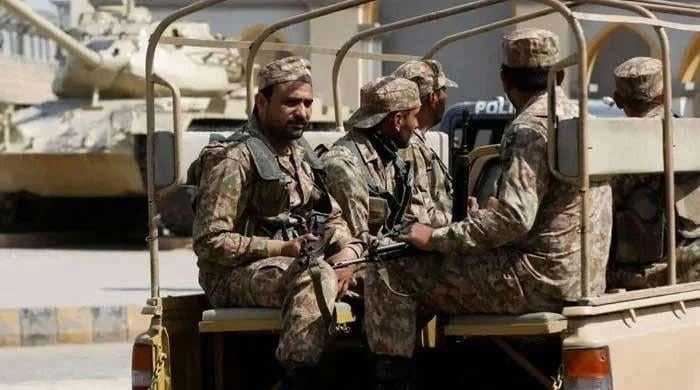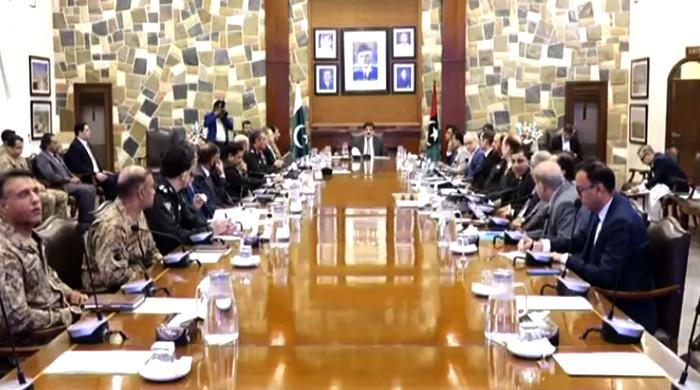Imran Khan arrested in Al-Qadir Trust 'corruption' case for embezzling Rs60bn: minister
PTI chief’s lawyer tells media Rangers personnel “tortured” former prime minister during arrest
May 09, 2023

- Sanaullah says Imran Khan arrested for causing damage to national treasury.
- "No sort of torture was inflicted on PTI chairman," security czar says.
- Imran Khan used NAB against others while he was in power: Khawaja Asif.
Minister for Interior Rana Sanaullah said Tuesday that Pakistan Tehreek-e-Insaf (PTI) Chairman Imran Khan's been arrested in the Al-Qadir Trust corruption case for embezzling Rs60 billion.
Talking to media in Islamabad, he said the United Kingdon's agencies have traced ill-gotten money worth £190 million of a property tycoon, which actually belonged to the people of Pakistan.
He said that £190 million (or Rs60 billion) had to be repatriated to the national exchequer of Pakistan, but it was adjusted in Supreme Court’s account.
"What an irony it is that the apex court did not take notice of the adjustment of this big amount," the interior minister said, whose government is currently at loggerheads with the top court.
Giving details of the "corruption" in the name of Al-Qadir Trust, Sanaullah said over 450 kanal of land situated in Sohawa and another piece of land measuring 224 kanal in Banigala were registered in the name of this trust.
He said it is worth noting that Khan and his spouse are sole trustees of this property. He further disclosed that 240 kanal land in Bannigala was registered in the name of Khan’s front-woman Farah Gogi, who is a closed confidante of the former prime minister and his wife, Bushra Bibi.
'No torture'
In a tweet earlier, the interior minister categorically denied reports of inflicting torture on PTI Chairman Khan during his arrest by Rangers personnel from the Islamabad High Court (IHC).
Taking to Twitter, the Pakistan Muslim League-Nawaz (PML-N) senior leader said: "Imran Khan did not ensure his appearance despite several notices. The National Accountability Bureau (NAB) arrested him for causing damage to the national treasury.
"No sort of torture was inflicted on him [Khan]," the interior minister wrote on his official handle.
Later, while speaking during the press conference, Sanaullah reiterated that no one was subjected to torture at the time of the deposed PM's arrest, saying that the PTI chief's security personnel had inflicted violence.
"The Rangers did not break the windows, they were broken during the chaotic situation," he added.
Rangers ‘tortured’ Imran Khan
Earlier, Khan’s lawyer Barrister Ali Gohar told media persons that the Rangers personnel “tortured” the PTI chairman during the arrest.
“Imran Khan was hit on the head and his injured leg,” he claimed.
Gohar added that he and Ali Bukhari were present with the PTI chief at the time of the arrest.
“Rangers broke through the glass and entered the diary branch,” Advocate Gohar further said, adding the law enforcers broke IHC’s main gate before ransacking the high court office.
'Law to take its course'
Meanwhile, Defence Minister Khawaja Asif said that Imran Khan used NAB against others while he was in power, referring to later's prime ministership from 2018 to 2022.
"People were arrested on his demands and they were tortured to satisfy this ladla's ego. Even daughters and sisters were detained by NAB. Only law will take its course now as it is not subject to anyone," wrote the defence minister.
Imran Khan's arrest
Earlier today, the former premier was arrested by Rangers personnel from Islamabad High Court (IHC) acting on NAB's warrant.
The PTI chairman was arrested as part of the NAB’s investigation in the Al-Qadir Trust case ahead of his appearance before the IHC to seek bail in multiple FIRs registered against him.
The Rangers personnel driving a black Toyota Hilux Vigo took Imran Khan away to NAB Rawalpindi.
Khan's dramatic arrest, in which paramilitary troops had to break several doors, jump through smashed windows, and scuffle with PTI supporters and lawyers to reach the legally beleaguered firebrand politician, has sparked protests across the country.
Inspector General of Police, (IGP) Islamabad Dr Akbar Nasir Khan confirmed the development and said that the situation was under control.
According to Geo News, the PTI chairman was in the IHC's biometric verification department when he was nabbed by security personnel. The NAB officials had arrest warrants.
Khan’s warrants were issued on May 1 by NAB chairman Lt Gen (retd) Nazir Ahmad Butt.
As per details, Khan was booked under Section 9A of the National Accountability Ordinance 1999.











